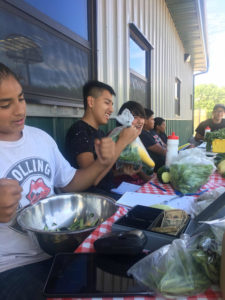
- Details
- By Native News Online Staff
EAGLE BUTTE, S.D. — Last week, Wednesday the first COVID-19 case was identified on the Cheyenne River Indian Reservation. Chairman Harold Frazier ordered a curfew and issued a stay-at-home order. Knowing the daily lunch program is important to its participants, the Cheyenne River Youth Project shifted gears and activity continues at its Eagle Butte campus.
Staff transformed their Daily Sack Meal program into a delivery service, which began on Monday, May 4, so they easily can distribute daily sack meals to children at their homes throughout Eagle Butte.
Additionally, they continued to prepare takeout meals at the Keya Cafe & Coffee Shop, with a new mask requirement for anyone entering the building (masks are available for those who need them); and perhaps most important of all, they continued to move forward with spring planting in the 2.5-acre Winyan Toka Win Garden.
“We’ve been tilling and making our raised beds, because the spring weather has been much better than in previous years,” Julie Garreau, CRYP’s executive director said. “Growing food is an essential activity in our community, because far too many people lack basic food security here. We rely on our garden’s fresh produce for our youth meals and snacks, and for menu items in the Keya Cafe. We share it with the elderly, and we make it available to the community through our Leading Lady Farmers Market.
“We also understand here that our garden represents so much more than food,” she continued. “Planting a garden is an investment in native wellness, and it strengthens our connection to our Lakota culture. It’s also the ultimate sign of hope for the future. It shows our kids, especially, that we will come out of this pandemic stronger and more resilient than ever. We should never stop planning, or planting.”
The Winyan Toka Win Garden lies at the heart of CRYP’s Native Food Sovereignty initiatives. It serves as an outdoor classroom for The Main’s Garden Club and the Native Food Sovereignty Teen Internship, as well as for food-related classes and workshops for the public.
Although the CRYP staff normally depends on volunteer support throughout the growing season, all spring and summer volunteer service groups are cancelled. Garreau said she and her team will tend the garden and put in as much time as necessary for a successful harvest.
“Our community needs this food, and our kids need to know that the garden will be here for them when we can welcome them back,” she said. “Hats off to my staff for working so hard, and never wavering in their dedication to our kids and community.
More Stories Like This
Native News Weekly (August 25, 2024): D.C. BriefsDeb Haaland Rolls Out Affordability Agenda in Albuquerque
Boys & Girls Clubs and BIE MOU Signing at National Days of Advocacy
National Congress of American Indians Mourns the Passing of Former Executive Director JoAnn K. Chase
Navajo Nation Mourns the Passing of Former Vice President Rex Lee Jim
Help us defend tribal sovereignty.
At Native News Online, our mission is rooted in telling the stories that strengthen sovereignty and uplift Indigenous voices — not just at year’s end, but every single day.
Because of your generosity last year, we were able to keep our reporters on the ground in tribal communities, at national gatherings and in the halls of Congress — covering the issues that matter most to Indian Country: sovereignty, culture, education, health and economic opportunity.
That support sustained us through a tough year in 2025. Now, as we look to the year ahead, we need your help right now to ensure warrior journalism remains strong — reporting that defends tribal sovereignty, amplifies Native truth, and holds power accountable.
 The stakes couldn't be higher. Your support keeps Native voices heard, Native stories told and Native sovereignty defended.
The stakes couldn't be higher. Your support keeps Native voices heard, Native stories told and Native sovereignty defended.
Stand with Warrior Journalism today.
Levi Rickert (Potawatomi), Editor & Publisher

